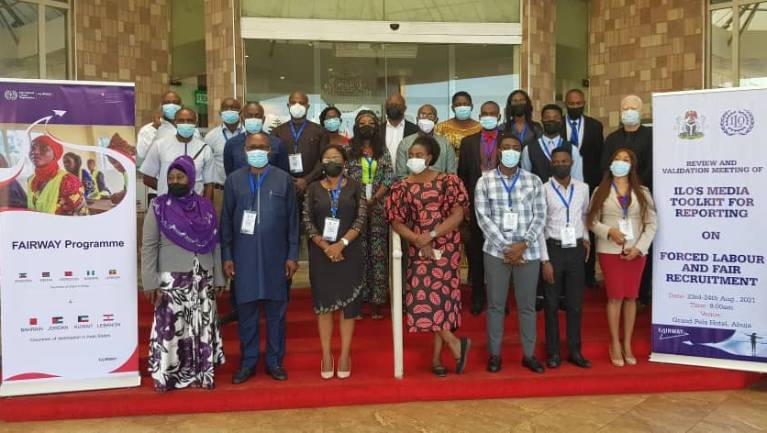ILO Strengthens Capacity of Media and Civil Society Organizations for Effective Reportage and Engagement in the area of Forced Labour and Fair Recruitment in Nigeria
Posted at September 1st 2021 12:00 AM | Updated as of September 1st 2021 12:00 AM
Region/Country : Nigeria
|Themes : Media, Forced labour
In a bid to address knowledge and capacity gaps of stakeholders, including media and Civil Society Organizations (CSOs) in the area of forced labour, the International Labour Organization (ILO) validated the global media toolkit on Forced Labour Reporting and Fair Recruitment contextualized for use in Nigeria from 23 – 24 August.
In 2020, ILO launched a global media Toolkit on Forced Labour and Fair Recruitment to contribute to quality reportage by journalists in the area of forced labour and recruitment. The Toolkit has an accompanying media-friendly glossary on migration and provides concrete tips for improving media story ideas to promote production of quality reporting on forced labour and fair recruitment issues.
In Nigeria, ILO commenced the adaptation of the toolkit in 2020 and facilitated a presentation of the draft document to integrate stakeholders’ feedback during a virtual meeting organized in February 2021. This informed the meeting convened to review and validate the contextualized draft toolkit by national stakeholders in August. Participants at the two-day event included journalists, media and civil society organizations, members of the Technical Working Committee (TWC) on the implementation of the National Policy on Labour Migration and ILO tripartite constituents.
In a welcome remark delivered during the event on behalf of Ms. Vanessa Phala, the Director of ILO Abuja Country Office, the intent of ILO to work more collaboratively with relevant stakeholders in addressing discriminatory attitudes towards migrant workers, in addition to facilitating improved access to information and support services throughout the migration cycle was restated.
Ms. Phala informed participants that the engagement is facilitated within the framework of the FAIRWAY programme supported by the Swiss Agency for Development and Cooperation (SDC), and encouraged stakeholders to tap into the resource in ensuring accurate, factual and non-sensationalized reporting of stories related to labour migration.
The representative of the Honourable Minister, Federal Ministry of Labour and Employment (FMLE), Dr. Sunday Onazi in his remarks enjoined stakeholders in the National migratory space to support the Media in their effort to operationalize the toolkit.
Additional goodwill messages delivered on behalf of Dr. Timothy Olawale, Director General of the Nigeria Employers Consultative Association (NECA), and Ismail Bello, Acting General Secretary of the Nigeria Labour Congress (NLC) noted the involvement of ILO constituents in the process of adapting and validating the toolkit for use in Nigeria, further reinforcing respective institutional commitment towards addressing practices related to forced labour.
Upon conclusion of a clause by clause review and perusal of the toolkit by participants, a motion for validation was moved by Tersoo Zamber of the Federal Radio Cooperation of Nigeria (FRCN) and seconded by Joy Ativie of the Centre for Youth Integrated Development (CYID).
Going forward, ILO seeks to support the establishment of specialized networks of journalists’ in the area of forced labour and fair recruitment reporting, including through delivery of trainings for media and civil society groups across the country.
The contextualized media toolkit and glossary adapted for use in Nigeria contains a number of select specific relatable stories, street lingo and slangs, representative of experiences encountered by migrant workers.
The introduction of Nigerian terminologies into the toolkit is deemed as a user-friendly approach in ensuring country specific context is retained and adequately captured during reporting stories in the area of forced labour and fair recruitment by the media.
Flowing from the closely knit working relationship between media and CSOs across a wide range of thematic areas, the adaptation process actively involved civil society groups that are members of the TWC on the implementation of the National Policy on Labour Migration.
Members of the TWC who participated at the event included the Nigerians in Diaspora Commission (NiDCOM), National Commission for Refugees Migrants and Internally Displaced Persons (NCFRMI) and the National Agency for Prohibition of Trafficking in Persons (NAPTIP)
It is believed that through the cordial engagement and existing relationships of these stakeholders, broader sectoral policy aspirations would be complemented and sustained, including in the area of implementation of the revised National Policy on Labour Migration (NPLM).

